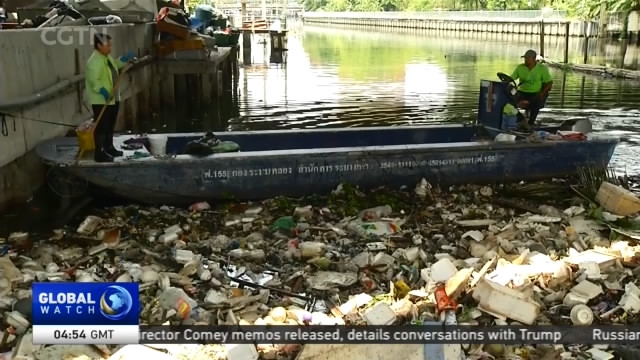
15:02, 21-Apr-2018
Earth Day: Thailand's efforts in cleaning up plastic pollution in the Mekong River
02:56

April 22nd is Earth Day. This year's focus is on plastic and raising awareness of the enormous pollution problem it creates. Almost all of the plastic waste found in the world's oceans comes from just 10 rivers – and eight of them are in Asia. The organizers of Earth Day say plastic is threatening the planet's survival. Martin Lowe has more from Thailand, one of the countries the Mekong flows through.
Bangkok - 12 million people producing plastic waste. Much of it ends up here in the city's canals. Cups, bottles, food containers and bags; plastic so tough it can last hundreds of years without degrading. Huge amounts of waste is carried into rivers and then onwards to the ocean. Rivers like the Mekong, which flows through six Asian countries: China, Myanmar, Cambodia, Thailand, Laos and Vietnam - before dumping the waste into the South China Sea. Now German research has revealed the Mekong is one of just 10 rivers worldwide that between them carry up to 95 percent of all the plastic that ends up in the oceans. This Thai marine biologist says Mekong countries produce mountains of waste and then the rains come.
THON THAMRONGNAWASAWAT MARINE BIOLOGIST "The countries around here have a lot of flooding in the heavy rain, the rainy season, when flooding comes the plastic that you dump – the big plastic mountain – the flooding takes it to the river and the river to the sea."
A phenomenon increasingly seen is the accumulation of plastic waste at sea - known as 'trash islands'. This one was discovered in Thailand in 2017, just off tourist beaches. The German team says failure to manage waste at source is one of the main reasons so much ends up in the ocean; where it kills aquatic life and devastates the marine environment.
MARTIN LOWE BANGKOK "Here in Thailand many shops automatically serve all goods in plastic bags - and routinely give out plastic stirrers and straws with any drink. To reduce waste, consumers are now being urged to say no to plastic products and there are plans to introduce a charge for any bag from a store."
There is a ray of hope for the first time scientists have created an enzyme that can break down plastic. It follows the discovery in Japan of a bacterium that gradually attacks the material. International researchers improved the process to create an enzyme that starts breaking down plastic in just a few days far quicker than the centuries it takes in the oceans. Martin Lowe, CGTN, Bangkok.

SITEMAP
Copyright © 2018 CGTN. Beijing ICP prepared NO.16065310-3
Copyright © 2018 CGTN. Beijing ICP prepared NO.16065310-3